UW honors the best of 1996
Every year faculty, students and alumni meet to decide who are the top UW teachers, public servants and volunteers, and this year they came up with a remarkable list. Five are faculty who have won Distinguished Teaching Awards, two are TAs honored with Excellence in Teaching Awards, and four are members of the UW community recognized for their service by receiving either the UW Outstanding Public Service Award, the UW Recognition Award or the UW Alumni Association Distinguished Service Award.
Robert Steiner
Distinguished Teaching Award
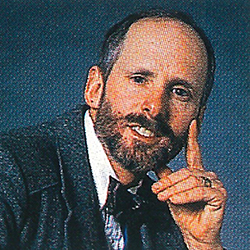 When Robert Steiner, a medical school professor with appointments in both obstetrics-gynecology and physiology-biophysics, volunteered to teach the large undergraduate Biology 202 course a few years ago, he was looking for a new teaching experience.
When Robert Steiner, a medical school professor with appointments in both obstetrics-gynecology and physiology-biophysics, volunteered to teach the large undergraduate Biology 202 course a few years ago, he was looking for a new teaching experience.
Although many colleagues find his dedication to this course remarkable, Steiner himself doesn’t think so.
“I love teaching undergraduates,” says the 1996 Distinguished Teaching Award winner. “I really enjoy their joyful enthusiasm and their wide interest in things. There’s nothing I like more than to go into the biology labs and work with a few students one-on-one on a problem.”
Steiner, who is internationally known as a researcher in reproductive endocrinology, author of more than 100 scientific papers, and a textbook editor in physiology, says he enjoys teaching at all levels—from undergraduate to postdoctoral. “I find the differences stimulating,” he says. In addition to teaching general biology, he also teaches human reproduction for medical students and neuroendocrinology for graduate students.
“I think there’s a tendency, especially for senior researchers, to just concentrate on the very specialized area of their research, but I find it useful to try to keep the bigger picture in mind.”
As a science teacher, Steiner is known for a certain philosophical and poetic bent, and he often begins a presentation with a poem or reading. Students new to his classes, he says, often have the reaction: “What is with this guy?”
“Dr. Steiner left me dumbfounded when he began class by reading a poem about watching a red-tailed hawk glide across a snow-covered field,” says one student. “This was not the kind of science lecture I was used to! I appreciated that poem, and I believe Dr. Steiner made his point: Biology is the science of life, and it concerns life outside of the lab, outside of the lecture hall, as well as in these places.”
“Ultimately,” Steiner says, “I look at the study of science as a human experience. We humans bring our emotions, and ourselves, to the study of science and I think it’s important to keep that perspective in mind.”
Over the years he has taught, he’s given a lot of thought to what can be accomplished in the classroom and to the limitations on what can be achieved. Most learning, he believes, takes place when a student is personally engaged with the ideas and material. For this process, Steiner is willing to use poems, vignettes, antics—whatever works.
“I think it’s a real privilege to teach at this great University,” he says, “And I see my role like that of a tour guide to a wonderful place. I’m planning the trip, but then I also get to go along. ”
Steiner came to the UW in 1975 after earning a Ph.D. in physiology at the Oregon Health Sciences Center in Portland. After a senior fellowship in physiology and biophysics, he became a faculty member with appointments in that department and in obstetrics and gynecology, as well as an adjunct appointment in zoology.
He is also a research affiliate of the Regional Primate Research Center and the Diabetes Research Center, and co-director of the Population Center for Research in Reproduction, as well as director of the Reproductive Biology Training Program.—Claire Dietz, Health Sciences News and Community Relations
George Bridges
Distinguished Teaching Award
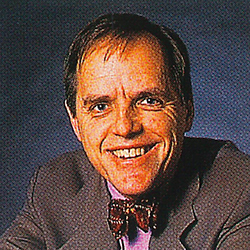 Back in the days when George Bridges was an undergraduate at the UW, he recalls walking into a large classroom and watched the professor “capture defeat from the jaws of victory.”
Back in the days when George Bridges was an undergraduate at the UW, he recalls walking into a large classroom and watched the professor “capture defeat from the jaws of victory.”
“He had great material to work with but couldn’t lecture. I remember thinking that if I became a teacher I’d want to do a better job than that guy,” says Bridges, who is a 1996 Distinguished Teaching Award winner.
Whenever the topic of teaching large classes at the UW comes up, Bridges’ name inevitably is mentioned, usually in connection with Sociology 271, a legendary class that attracts more than 500 students.
But Bridges’ impact on quality teaching extends far beyond own classroom. He is the director of the two-year-old Faculty Fellows Program for new faculty. He’s also one of the founders of Large Lecture Instructors, an informal group who teach the biggest classes on campus, and he directs his department’s PEW Foundation Program for Preparing Future Faculty.
Bridges conceived of the Faculty Fellows Program, a kind of teaching institute, more than two years ago and sold the idea to former Provost Wayne Clough. One of the few of its kind in the country, it introduces new UW faculty to teaching with an intensive, one-week seminar and follow-up sessions through their first year.
“Junior faculty spend so much of their time on teaching— learning things that older, more experienced people have already learned. This is just a way of transferring that knowledge,” says Bridges.
The large lecture group also grew out of Bridge’s energy. The group was founded four years ago by Stan Chernicoff, senior lecturer in geological sciences; Barbara Clinton, a former faculty member in speech communications; and Bridges.
“We created it selfishly out of our desire to find out what others who teach large classes are doing in the classroom and to create a dialog among ourselves,” explains Bridges. “We brought in accomplished lecturers from off campus, people with great ideas to share with us, and I’ve found this is really helpful to my work.”
Bridges works hard at teaching. He always has, but he had to overcome an innate shyness to feel comfortable lecturing to 500 students. His first teaching job was an introductory sociology course for eight students at Case Western University in Cleveland in the early 1980s.
“At the end of the semester, one of the students came up and told me that my face turned beet red the entire semester, every time lectured. I was very unskilled at public speaking,” recalls Bridges. “When I came to the UW, Sociology 271 was my assigned class. I worked very hard to have lectures prepared. For several years, I wrote out every lecture word for word and then I’d internalize them, almost memorize them, so I would be more of myself in class.
“I’ve learned to teach a big class as if it was a small one. I try to make abstract ideas personal, as a way of bringing students into the dialog. I’m a story teller. I tell my story and then ask students to tell theirs.”
Over the years, Bridges skills as a teacher have drawn accolades from undergraduate and graduate students, colleagues and even members of the University’s Board of Regents. “I’m trying to affect and improve the teaching on this campus and, at the same time, offer my students the idea that learning can be absolute fun. Something is wrong if it isn’t fun,” he says.—Joel Schwarz, UW Office of News and Information
James Clauss
Distinguished Teaching Award
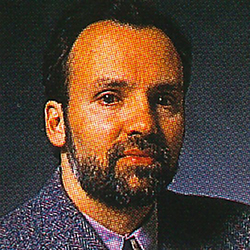 Is the history of Rome the history of dead white men?
Is the history of Rome the history of dead white men?
Yes—and no, says Classics Professor James Clauss. “Rome was multicultural from the beginning,” he declares. The Roman Empire eventually spread to Spain, North Africa and the Middle East, and members of conquered ethnic groups gradually rose to power. It was an empire, and is a history, that has been over-characterized in modern times as “For Whites Only.”
Clauss’ enthusiasm for the classics, his ability to make them relevant today and his interest in his students have earned him a 1996 Distinguished Teaching Award. He has taught a wide range of courses offered in the classics department, but the courses that have brought him the most acclaim have been the two he teaches in conjunction with the Office of Minority Affairs. In one he uses Latin to teach English grammar to students in the Educational Opportunity Program; in the second he takes students to Rome for an 10-day course in ancient Roman history.
A colleague describes Clauss’ grammar class as “one of his most remarkable innovations.”
“Latin helps students identify parts of speech and understand their relationship to one another,” Clauss says. “There is a rigor and discipline involved in its study that has great value.
“By and large, minority students bring a different perspective to the classroom and community, and because of that, they can make an important contribution to the UW in particular and American society in general,” he says. “If they can articulate their ideas clearly and with eloquence, people will listen. My goal in Classics 102 is to show students the way toward gaining a solid command of the English language, a skill that will give them the power to be heard.”
The second course, an intensive five-credit, upper-division class in Rome, gives Clauss the chance to debunk the myth that Western civilization is only a story of dead white males.
“The students learn how much Roman culture has influenced their own lives—the architecture they see every day; the legal system they live in. They quickly come to realize that they are a part of this very long tradition. They may not like it, but they are a part of it,” Clauss explains.
The Rome study group can include African American, Hispanic, Asian, Native American and white students who may be anxious about traveling and living with students of other ethnic backgrounds. The experience of being foreigners in a foreign land helps them see their commonalty. “They are all in the same boat; they are Americans in Italy,” he says.
The class is not just a trip to Rome over spring break. There are several meetings before the trip, afternoon classes coupled with walking excursions through the city, weekly classes after returning to Seattle, oral reports, a research paper and a joint project.
“It would be great to be able to walk through all of my courses like we walked through Rome,” says one student. “It is so much easier to live what you learn.”
Clauss recently has written an experimental textbook for his English grammar through Latin course—a concept that is being picked up by other universities around the nation—entitled Terminal Latin. The book’s name mirrors the course’s philosophy: The aim is not to make a classicist of every student, but to teach them enough so they are no longer “linguistic couch potatoes” and have a greater appreciation for Western civilization and their essential part in it.—Nedra Pautler, UW Office of News and Information
Victoria Lawson
Distinguished Teaching Award
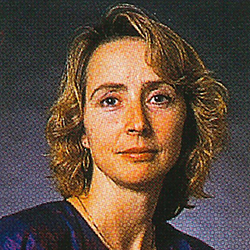 Victoria Lawson’s first teaching experience wasn’t auspicious. She prepared two days for a lecture that she ended up delivering in about 10 minutes. “I was sheer nerves,” she recalls.
Victoria Lawson’s first teaching experience wasn’t auspicious. She prepared two days for a lecture that she ended up delivering in about 10 minutes. “I was sheer nerves,” she recalls.
Somewhat later in her teaching career, the associate geography professor was lecturing about world geography using an overhead transparency of a globe. Throughout the class, she kept pointing to the globe. She was nervous but thought the lecture went well.
After class, a student told her that she had delivered the entire lecture with her transparency upside down and backwards.
Despite these setbacks, Lawson realized that she really loved teaching. “If there’s a prayer of me making a difference in anything,” she says, “it’s through teaching and showing students how to read the world differently. Teaching is simply the most important work that we do.”
Lawson, one of the winners of the 1996 Distinguished Teaching Award, specializes in the economic development of Latin America. A key to her teaching success, she says, is the energy in the classroom. “I try to present the world in a way that challenges people’s everyday knowledge. As soon as you get them off center and ask them to question some received wisdom, you tap into their energy. I’ve learned how to play with that energy, to try and make people look at things differently.”
One of the nicest compliments she has received came from a student who didn’t agree with her point of view. It was a large class, about 150 students, and one of the brighter students had views fairly far right of center. (“Mine were usually on the other side,” she says.) The student often challenge the thrust of the lecture. At the end of the quarter, he thanked Lawson for making him feel secure enough to make those comments. “It was a huge compliment,” she says, “that I could create an environment in the classroom where all different perspectives could be heard.”
One of the challenges Lawson faces is bring issues of international development “home” to her students. As a result, Lawson has become an advocate of service learning, where students do community service as part of their course work.
“It’s a way to get the students’ attention. One of the things that worries me about service learning is that some may think of the students as missionaries. I think of service learning very differently. The complexity of issues are brought forth in a way more forceful than I can do in the classroom.” Students who study Latin America, for example, may volunteer to work with an immigrants’ rights project. They bring what they have learned through volunteering back to the class.
In addition to her formal teaching load, Lawson spends a great deal of time after class and in her office talking to students, helping them think about majors, career paths and alternatives. Some of the most important learning, she says, takes place in those sessions. “It’s not usually counted in a professor’s teaching hours, but it should be.”
There is no question that her dedication has made an impact on many lives. “Professor Lawson is the professor that has contributed most to my love for learning at this institution,” one student writes. Says another, “I have learned more than just to be a better thinker, writer and student in Professor Lawson’s classes. She encourages us to see the problems of the world in all its facets, not just one perspective. And because of that, I have become a better person.”—Bob Roseth, Office of News and Information
Edwina Uehara
Distinguished Teaching Award
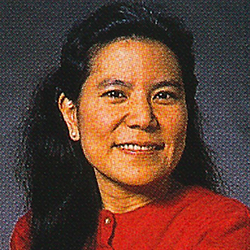 When Edwina Uehara found a message on her answering machine that the President of the University of Washington wanted to speak with her, she panicked.
When Edwina Uehara found a message on her answering machine that the President of the University of Washington wanted to speak with her, she panicked.
“I was just granted tenure and I thought, ‘Oh my gosh. There’s a problem,'” she recalls. But her husband, a realist who doesn’t even work in academe, calmed her immediately. “If it were bad news, he’d make your dean tell you,” he said.
When the social work professor finally talked with President Richard McCormick, she learned she was one of five faculty awarded a 1996 Distinguished Teaching Award. “It is probably the most exciting thing that has ever happened to me,” she says.
Well, maybe the second-most exciting, for a few weeks after that phone call, Uehara and her husband, Michael Smukler, flew to Nanking, China, to meet their new adopted baby girl, Emiko.
Her new daughter is Chinese, her husband’s family has a European background and Uehara herself is Japanese American. The diversity of her home life mirrors what she teaches in the UW School of Social Work—social networking, mental health services and ethnographic research methods particularly as they relate to ethnic minorities.
But the classroom wasn’t Uehara’s original career destination. After she earned her B.A. at Eastern Washington and her M.S.W. at Michigan, she spent 13 years in the field, much of it with a non-profit policy research center in Chicago.
“I didn’t have teaching on my mind at all,” she admits. But after earning her Ph.D. at the University of Chicago, she was a postdoctoral fellow there, teaching a new course in ethnographic research. “I had to put the course together from scratch. Even the planning was exciting. Then I had a small group of dedicated graduate students. Every session was explosive with excitement.”
Uehara was hooked on teaching. When an opening came up at the University of Washington in 1990, she got the tenure-track position. Since then, Uehara has taught both quantitative and qualitative research courses, seminars on interpretive methods and on social work administration and management, plus graduate research seminars.
In nominating her for the award, Social Work Dean Nancy Hooyman noted Uehara’s “multidisciplinary approach to teaching, in which she effectively integrates issue of race, class, gender and sexual orientation; her energy and extensive preparation; and her responsiveness to student feedback.”
Her students are ecstatic in their praise. “As a student training to teach, I find Professor Uehara’s abilities as a teacher to be examples of what the University offers at its best,” says one. “She was able to make what can be very dry material come alive,” writes another.
One of her teaching secrets is individual attention. She fosters work in small groups and usually requires individual meetings with each student. “Students are not empty vessels. They have life trajectory and a learning trajectory. You need to know them both,” she declares.
Uehara is a master in taking those life experiences and weaving them into her coursework. A few years ago, when there were racial tensions in the school, Uehara had to deal with the anger in her classroom. “The students weren’t learning,” she says. “I had to stop to deal with the issues.
“It was the scariest moment for me in teaching. The students were very emotional. We had to lay ground rules on how to do it.” Not only did tensions ease, but the students were so impressed with Uehara that they voted her the best teacher in the school that year.
Uehara herself has experienced plenty of diversity as a student. Her father was in the military, and she attended 13 different schools between kindergarten and her junior year of high school. Some of those schools were in Japan and Thailand.
Of her experiences at American schools in foreign lands, she says it was “a gift. It shaped me forever.” The diversity of the student body made a profound impact on her. “If I could send every American high school student overseas for a year, I would.”
Looking over her field, Uehara at times is pessimistic, especially when she sees the impact of managed care on mental health services in ethnic minorities. “I see care to chronically mentally ill groups falling through the cracks,” she warns.
But there is optimism as well. “Social work is an applied area. We believe in human agency and the potential for change,” she says. And this optimism, this belief in humanity, is perhaps the key to Uehara’s great success in the classroom and in research. As one of her students put it, “She has a great mind and an even bigger heart.”—Tom Griffin, Columns Magazine
Antonio Olarrea
Excellence in Teaching Award
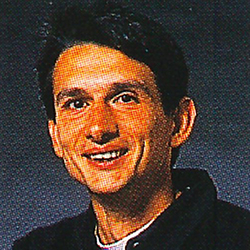 Antonio Olarrea likes to tell little jokes on himself. One of his favorites illustrates something about this his remarkable life:
Antonio Olarrea likes to tell little jokes on himself. One of his favorites illustrates something about this his remarkable life:
When Olarrea first arrived in the United States from Spain in 1987, he spoke almost no English and could read it only with difficulty. As a Spanish language instructor at Iowa State University, he knew he had to learn the tongue of his newly adopted land, quickly. So he turned to Cheers reruns.
“I could watch three segments of the show every day, which was great because I needed to learn the context, with my dictionary in hand,” he recalls. “So when I went to a department meeting on my first day at work, I opened the door and said what I thought you said in English whenever you entered a room: ‘Norm!’
“That didn’t work very well,” he says, chuckling.
Today, one hears just a soft trace of his native accent in his voice (and not even a hint of Sam Malone). But still, Olarrea—Antxon (pronounced “ANN-taun”) to his friends—manages to make use of his accent in his work as a TA both in linguistics and Spanish.
“As a class project, I ask students to use their linguistic knowledge to explain the patterns in the kinds of mistakes I make—especially in pronouncing the many more vowel sounds that English has compared to Spanish. The idea is to show students that accents are regular and can be accounted for, linguistically.”
Olarrea, a Ph.D. candidate in linguistics, completed his undergraduate studies in Madrid, the city in which he grew up. He spent three years at Iowa State before coming to the UW in 1990 to pursue graduate study in linguistics. He is one of two TAs to win a 1996 Excellence in Teaching Award.
He’s been teaching either Spanish or linguistics since he arrived. “Teaching has a theatrical part to it: You are an actor telling stories every day, and that’s fun,” he says. “Also, sometimes you only learn things when you have to explain them to someone else. You think you know it, but you learn more when you have to make it really simple, organized and clear for a class.”
Olarrea has nothing but good things to say about his students. “There is a tendency to blame students for many things—to say that they’re not as good as they used to be, that they’re lazy and so forth. But I disagree strongly. It’s amazing to think about how many good students you can have in a class, especially when so many of them also are working at part- and full-time jobs and taking so many credits.”
In turn, students and colleagues praise Olarrea. “Antxon walks into class each day with a big smile and warm ‘hello,’ ” a student writes. “I am quite confident in stating that I will never have a better TA.”
To quote one professor, “Antxon Olarrea is the kind of teacher we would all love to be. He has a basic gift for teaching that he amplifies with endless hours of preparation and availability to his students… It is hard to think of a more ideal candidate for this award.”—L. G. Blanchard, Office of News and Information
Linda Stephens
Excellence in Teaching Award
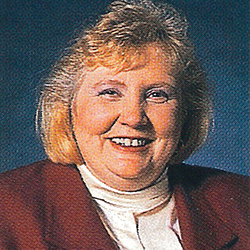 Once upon a time in Wisconsin, Linda Stephens was told she wouldn’t be a teacher. These days she’s being told with some regularity that she is not only a teacher, but one of the best. The 1996 Excellence in Teaching Award is the sociology graduate student’s third such honor; she won her department’s teaching award two years ago and the Marie Doman Award—given by the women studies department to an outstanding teacher in the College of Arts and Sciences—last year.
Once upon a time in Wisconsin, Linda Stephens was told she wouldn’t be a teacher. These days she’s being told with some regularity that she is not only a teacher, but one of the best. The 1996 Excellence in Teaching Award is the sociology graduate student’s third such honor; she won her department’s teaching award two years ago and the Marie Doman Award—given by the women studies department to an outstanding teacher in the College of Arts and Sciences—last year.
Not bad for someone who almost gave up on education completely. “I always wanted to be a teacher,” Stephens says. “But when I went to the University of Wisconsin in the ’70s, the adviser called us education majors into a room and told us there were no jobs for us and we should choose something else. I was so discouraged that I dropped out of school.”
She worked at other jobs, got married and had a couple of kids, but the dream of teaching kept nagging at her. Eventually she went back to complete her undergraduate degree, with the idea of becoming a high school teacher.
“I had only been back a short while when I realized how much I loved research,” Stephens says. “Then I decided I wanted to do both teaching and research, so it made sense to go to graduate school.” She chose the UW in large part because it offered extensive training for teaching—both in the department and University-wide.
It is training Stephens has taken full advantage of. After only a year as a TA, she was given her own classes, including a stint with the interdisciplinary writing program as well as teaching introductory sociology. What she has mostly taught, however, are courses on the family, her major area.
Stephens likes to get students involved in her classes. She often divides the class up into small groups whose members present some portion of the subject to the whole class. Then, each member of the group develops a research paper based on material collected for the presentation. “That has worked really well in that the students really like the ownership they take of that sub-topic. They become very involved in it and feel they really know something about that topic by the end of the quarter,” Stephens says.
“And it’s so satisfying to see students make progress,” she adds. “It’s wonderful when you see them understand and use concepts that only a few weeks before were foreign to them.”
Stephens plans to continue her teaching career after she leaves the UW. Jobs may not be plentiful, but she had four offers after four interviews, and chose Clemson University because it provided the best balance between teaching and research. “Other places were offering me `enticements,'” Stephens says with a laugh. “They told me they’d reduce my teaching load if I went there. But that wasn’t attractive to me. I want to teach and I want to do research. I think I got wonderful training for both at the UW.”—Nancy Wick, UW Office of News and Information
Diana Wilkie
Outstanding Public Service Award
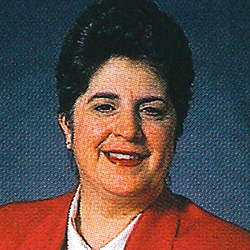 Nursing Professor Diana J. Wilkie’s boundless capacity for hard work and passion for relieving intractable pain are some reasons why she is the 1996 recipient of the UW’s Outstanding Public Service Award.
Nursing Professor Diana J. Wilkie’s boundless capacity for hard work and passion for relieving intractable pain are some reasons why she is the 1996 recipient of the UW’s Outstanding Public Service Award.
Described by her colleagues in the Department of Biobehavioral Nursing and Health Systems as selfless, tireless and extraordinarily competent, Wilkie is an expert in the assessment and management of pain, especially pain associated with cancer.
“We have the right to be free of pain,” says the soft-spoken Wilkie. “Pain serves to help with diagnosis, but there is no reason to hurt, once diagnosis is achieved and therapies have begun.”
Freedom from pain—despite severe illness—is a motto Wilkie carries with her in all her activities: her extensive research, her pro bono consulting in the medical community, her mentoring of nursing students, and her work with individual patients, nurses and doctors.
“Typically, her service is in medically underserved and remote corners of the state,” says colleague Eleanor Bond. “She shares new findings about pain management and invites the audience to contact her, resulting in hundreds of hours of consultations, always provided without charge.”
“We are extremely fortunate that she chooses to give selflessly to those in our community,” says Nursing Professor Joan Shaver, chair of Wilkie’s department, “be they people in pain or colleagues and students with the potential to alleviate suffering.”
Wilkie’s work has recently become more visible with the inauguration of the School of Nursing’s Comfort Coach, a motor home equipped as a traveling research lab. The coach travels to various hospitals in the region, furthering Wilkie’s research into relieving the pain of lung cancer patients.
Born into a poor farm family in Colorado, Wilkie has a strong sense of obligation to give back to the community. After receiving her Ph.D. from UC-San Francisco, she came to the UW in 1990, largely because of the presence here of the late Anesthesiology Chair John Bonica.
Asked if, like Bonica, personal experience led her to pursue the relief of pain as her calling, she recalls a turning point in her career. “I was an assistant head nurse in Colorado in 1981, caring for a man dying of cancer. I didn’t know how to take care of his pain. Because of the press of work, we couldn’t get to him to give him all the doses of pain medication prescribed. He spent three weeks in awful pain before he died.” With that memory haunting her, she resolved to learn all she could about effective pain relief.
Ironically, says Wilkie, despite great advances in pain-relief drugs, many health care providers aren’t well informed enough to keep patients pain-free. “My passion is to help nurses and physicians understand this, to show them that people don’t have to hurt.”
She believes that the assisted suicide movement would not enjoy so much support, if people knew their pain could be adequately controlled.
While some health professionals have concerns about over-prescribing narcotic pain medications, Wilkie says studies show that less than one patient in 3,000 has problems with addiction. “We’re taught to grin and bear it, and to under-report pain,” she says, “but pain is a detriment to our immune systems; pain itself can kill.”—Laurie McHale, Health Sciences News and Community Relations
Tom and Barbara Cable
UW Recognition Award
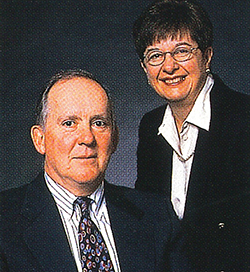 Neither Tom nor Barbara Cable attended the UW, but they have done so much for their “adopted” university that they will receive the 1996 University of Washington Recognition Award.
Neither Tom nor Barbara Cable attended the UW, but they have done so much for their “adopted” university that they will receive the 1996 University of Washington Recognition Award.
Barbara Cable has been active in the Seattle Chapter of ARCS and is national president of the ARCS Foundation. ARCS (Achievement Rewards for College Scientists) is a national women’s organization that raises money to support graduate students in science and engineering. The Seattle chapter has donated more than $1.5 million to the UW, supporting more scholars—234—than any other private donor. Barbara also is a member of the UW’s Rome Center Advisory Board. The UW is the only state university with an academic center in Rome, which gives many UW students the opportunity to study in this historic city.
Tom Cable serves on the UW Foundation Board of Directors as well as advisory boards for the School of Nursing, the College of Engineering, and the Applied Physics Laboratory. He is well known in the business community as a partner in Cable and Howse Ventures, a venture capital firm that has provided startup funding to more than 100 companies.
His talent for recognizing the value of emerging technologies has benefited the UW through his role as founder and current chairman of the Washington Research Foundation (WRF), a privately funded, non-profit organization that brings together Washington’s research community and private entrepreneurs. The foundation has worked with the University to obtain patents, license promising technologies and start new technology companies.
In addition to returning royalties to the University, the foundation has given the UW $1 million for an endowed graduate fellowship and pledged $2 million for an endowed chair. Tom Cable also helped bring about a $2 million gift for the Earl W. Davie/ZymoGenetics Endowed Chair in Biochemistry.
The Cables have made generous personal gifts to the University as well, supporting endowed fellowships in nursing and bioengineering among other contributions.
“We are extraordinarily fortunate to have Tom and Barbara Cable so involved in the life of the University,” says UW President Richard L. McCormick. “Their hard work, commitment, and creativity have enriched the University and the community we serve. They are wonderful friends of this institution, and we are delighted to recognize all they have done through this award.”—Antoinette Wills, UW Office of Development
Nancy Nash
UWAA Distinguished Service Award
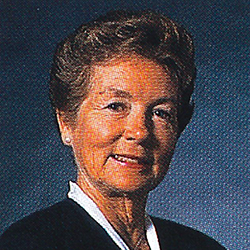 If you are one of the hundreds of thousands of people who has attended a UW Alumni Association event, chances are you know the work of Nancy Nash.
If you are one of the hundreds of thousands of people who has attended a UW Alumni Association event, chances are you know the work of Nancy Nash.
She helped create several of the events. Do you belong to an academic club? She helped start some of those, too. Been on a UW Travels cruise? She has helped lead them as well.
For more than 20 years, Nash has played a valuable role in the UWAA, either as a staff member or a volunteer, service that made her the clear choice to receive the UWAA’s 1996 Distinguished Service Award.
Fifteen years ago, Nash was one of about 10 employees at the UW Alumni Association. Though she held the title of assistant director, she was more like a jack-of-all-trades, signing up members, helping coordinate the travel program, staging events and working with clubs.
“We were pretty busy,” she says. “We did everything.”
It’s a pretty apt description of Nash herself. Always active as a volunteer in the community, Nash, ’51, started serving her alma mater early on, chairing her 25-year and 40-year class reunion committees. She later served on the UWAA Board of Trustees, then had to leave that—to become assistant director of the association in 1979.
Since retiring in 1989, she has barely slowed down, continuing to work behind the scenes for the association. Nash—who helped create such events as Oktoberfest, Dawg Dash and the Husky Hall of Fame banquet—also co-chaired a new event called Dawg Bite, now one of the UWAA’s mainstays.
“It seems that one way or another, I have been involved with the alumni association,” says Nash. And for good reason. “Alumni play a very important role with the University,” she says. “Their support of the UW—financially, politically, legislatively—is what helps make this University so strong. Maintaining close ties is what the alumni association is all about, and it is a job you can never stop doing.”
On June 6, Nash will experience something new—receiving an award from the UWAA. She used to be heavily involved in the award presentations the UWAA would make.
“Now I get to see the other side,” she says. “And I couldn’t be more honored. Serving the UW and the alumni association has meant a lot to me. And I will continue to keep my hand in it. It is too important to me.”—Jon Marmor, Columns Magazine